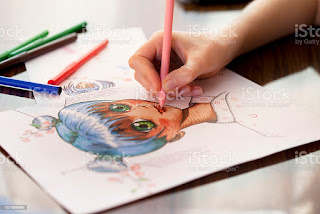"Manga" comes from the Japanese word 漫画, made out of the two kanji 漫 (man) signifying "unconventional or improvised" and 画 (ga) signifying "pictures".a similar term is the foundation of the Korean word for funnies, "manhwa", and the Chinese word "manhua".
The word originally came into normal utilization in the late eighteenth century with the distribution of such functions as Santō Kyōden's picturebook Shiji no yukikai (1798), and in the mid nineteenth century with so much fills in as Aikawa Minwa's Manga hyakujo (1814) and the observed Hokusai Manga books (1814–1834) containing arranged drawings from the sketchbooks of the popular ukiyo-e craftsman Hokusai. Rakuten Kitazawa (1876–1955) first utilized "manga" in the advanced sense.
In Japanese, "manga" alludes to a wide range of cartooning, funnies, and activity. Among English speakers, "manga" has the stricter importance of "Japanese funnies", in corresponding to the utilization of "anime" in and outside Japan. The expression "ani-manga" is utilized to depict funnies delivered from movement cels.





0 Comments